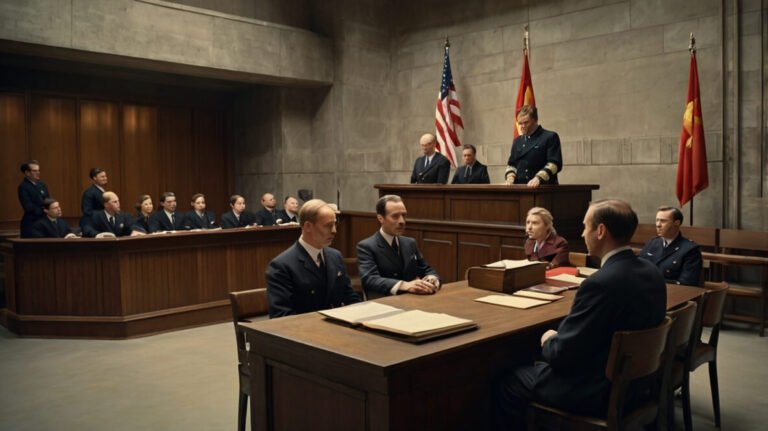International & War Crimes Tribunals have become a crucial tool for holding perpetrators of grave human rights violations accountable when national courts fail or refuse to act. From the horrors of the Second World War to the conflicts shaking Ukraine today, the evolution of these tribunals shows how far global justice has come—and how far it still must go.
This comprehensive guide explains what International & War Crimes Tribunals are, how they operate, their challenges, successes, and future. By the end, you’ll understand why these legal mechanisms remain vital for protecting humanity from the darkest acts imaginable.
What Are International & War Crimes Tribunals?
International & War Crimes Tribunals are specialized courts established to prosecute individuals accused of genocide, crimes against humanity, and serious war crimes that violate international law. These tribunals operate when national legal systems cannot or will not prosecute such crimes due to political interests, lack of capacity, or collapse of state structures.
From the Nuremberg Trials after World War II to the International Criminal Tribunal for the former Yugoslavia (ICTY) and the International Criminal Court (ICC) today, these legal bodies stand as a collective promise: the world will not tolerate impunity for atrocities.
A Brief History of International Crimes Tribunals
The Nuremberg Trials: A Turning Point
In 1945, the Allied powers established the Nuremberg Trials to prosecute Nazi leaders for war crimes, crimes against humanity, and genocide. This set the precedent for modern International & War Crimes Tribunals by demonstrating that individuals—even heads of state—could be held personally accountable for mass atrocities.
From Rwanda to Yugoslavia
The 1990s witnessed horrifying violence in Rwanda and the Balkans. The United Nations responded by establishing ad hoc International & War Crimes Tribunals: the ICTY and the International Criminal Tribunal for Rwanda (ICTR). These courts brought notorious figures like Slobodan Milošević to trial and convicted many responsible for the Rwandan genocide.
How Do International Crime Tribunals Work?
Jurisdiction and Mandate
International & War Crimes Tribunals have jurisdiction over crimes that shock the conscience of humanity. They prosecute genocide, war crimes, crimes against humanity, and aggression. However, they only intervene when domestic courts are unwilling or unable to act.
Investigations and Prosecutions
These tribunals rely on international investigators, prosecutors, and judges. They gather evidence from conflict zones, often at great personal risk. Witness testimonies—frequently from survivors—form the backbone of many cases.
Sentencing and Enforcement
Convicted individuals face prison sentences, usually served in countries that have agreements with the tribunal. Unlike national courts, there is no death penalty in International & War Crimes Tribunals, which aligns with global human rights standards.
Challenges Facing International & War Crimes Tribunals
Despite their noble purpose, International & War Crimes Tribunals face significant obstacles. Political resistance, limited funding, and difficulty enforcing arrest warrants often stall justice. For example, some high-profile suspects evade capture for years, living openly in countries unwilling to cooperate.
Additionally, critics argue that these tribunals can be slow and expensive. Investigations spanning multiple countries, languages, and decades naturally demand time and resources, but this often frustrates victims and the international community alike.
Why Do International Crime Tribunals Matter?
Ending Impunity
Without International & War Crimes Tribunals, many perpetrators would never be held accountable. National courts frequently lack the independence or capacity to prosecute powerful figures. These tribunals send a clear message: no one is above the law.
Deterring Future Crimes
Although some argue the deterrent effect is limited, the threat of international prosecution can force leaders to reconsider committing atrocities. High-profile convictions create fear among potential war criminals that they could one day stand trial.
Justice for Victims
Perhaps the most powerful impact is the acknowledgment of victims’ suffering. Survivors and families find a sense of closure knowing the world has recognized their pain and punished those responsible.
Comparison: Key Features of International & War Crimes Tribunals
| Feature | Cost | Efficiency | Ease of Use for Victims | Scalability | Benefits to Justice |
|---|---|---|---|---|---|
| National Courts | Lower cost | Generally higher | Easier access | Limited to domestic | Localized resolution |
| Ad Hoc Tribunals | High setup cost | Medium | Limited support access | Limited duration | Case-specific justice |
| ICC (Permanent) | High operational | Slower process | Improved victim support | Global jurisdiction | Ongoing deterrence |
| Hybrid Courts | Moderate cost | More flexible | Local involvement | Region-specific | Blends local & intl |
| Universal Jurisdiction | Varies | Unpredictable | Depends on state policy | Depends on nation | Expands accountability |
This comparison shows how International & War Crimes Tribunals balance cost, scale, and impact. While expensive and complex, their unique reach and moral authority justify their existence.
Notable International & War Crime Tribunals
International Criminal Court (ICC)
The ICC, headquartered in The Hague, is the first permanent International & War Crimes Tribunal. Established in 2002 by the Rome Statute, it prosecutes crimes when states fail to act. Although over 120 countries are parties to the ICC, powerful nations like the USA, China, and Russia have not ratified it, limiting its reach.
Hybrid Tribunals
Hybrid courts—like the Special Court for Sierra Leone—combine local and international judges and laws. They are often seen as a bridge between fully international tribunals and domestic courts, ensuring community involvement while maintaining impartiality.
Emerging Trends in International Crime Tribunals
Technology and Evidence
Modern conflicts generate vast amounts of digital evidence. Social media posts, satellite imagery, and intercepted communications now play crucial roles in trials. However, verifying and securing digital evidence pose challenges that tribunals are still learning to navigate.
Universal Jurisdiction
Some countries prosecute international crimes under universal jurisdiction, regardless of where they occurred. This trend closes loopholes when suspects flee to safe havens. Germany’s trials of Syrian officials for torture crimes are recent examples.
Regional Tribunals
Regional organizations are considering setting up their own International & War Crimes Tribunals. The African Union has explored regional mechanisms to complement or replace foreign-led courts, reflecting a growing push for local ownership of justice.
Public Perception and Emotional Impact
International & War Crimes Tribunals evoke powerful emotions—hope, anger, relief, and sometimes disappointment. For victims, seeing perpetrators face trial can validate their suffering. However, long delays and acquittals can reopen wounds, leaving communities feeling abandoned.
Therefore, improving transparency, communication, and victim support must remain priorities. People want to believe that global justice isn’t just symbolic but transformative.
How War Crimes Tribunal Affect Global Politics
Prosecutions can have ripple effects on international relations. Arresting a sitting leader may strain diplomatic ties or provoke retaliation. However, ignoring atrocities can damage a nation’s global reputation and invite sanctions or intervention.
Balancing justice with peace is a constant challenge. In some cases, leaders trade immunity for stepping down to end conflicts, raising ethical dilemmas: should peace come at the price of justice?
Lessons Learned from Decades of International & War Crime Tribunals
While International & War Crimes Tribunals are far from perfect, they have evolved dramatically since Nuremberg. Modern tribunals emphasize victims’ rights, gender-based crimes, and child protection far more than early models did.
They also inspire domestic reforms. Many countries have updated their laws to prosecute international crimes locally, showing how global justice shapes national systems.
The Future of International & War Crime Tribunal
Looking ahead, International & War Crimes Tribunals must adapt to new realities: cyberwarfare, autonomous weapons, and digital propaganda. These emerging threats create complex legal questions that existing frameworks struggle to address.
Additionally, building trust among communities remains essential. More inclusive tribunals—integrating local customs, languages, and victims’ voices—can strengthen legitimacy and impact.
International & War Crimes Tribunals must also secure sustainable funding to prevent political interference and ensure independent, timely justice.
Conclusion
In the end, International & War Crimes Tribunals represent humanity’s enduring commitment to confront evil with accountability. They stand as proof that the international community refuses to look away when unspeakable crimes occur..
FAQs
What is the role of International & War Crimes Tribunals?
International & War Crimes Tribunals prosecute individuals for crimes like genocide, war crimes, and crimes against humanity when national courts fail to do so.
How are International & War Crime’s Tribunals funded?
These tribunals are mainly funded by member states, international organizations, or specific agreements between nations and the UN.
Can International & War Crime Tribunals prosecute sitting leaders?
Yes, they can indict sitting presidents or officials, but enforcing arrest warrants often depends on international cooperation.
What is the difference between the ICC and ad hoc tribunals?
The ICC is permanent with global jurisdiction for member states, while ad hoc tribunals are temporary and created for specific conflicts like Rwanda or Yugoslavia.
Why do some people criticize International & War Crimes Tribunals?
Critics point to slow processes, high costs, and claims of bias or selective justice, especially when powerful nations evade accountability.
How can victims participate in International & War Crime Tribunals?
Victims may testify as witnesses, submit evidence, or receive reparations under tribunal rules
designed to amplify their voices and support recovery.

